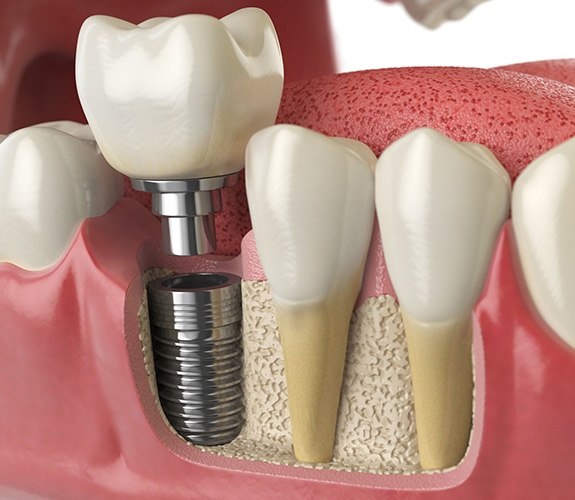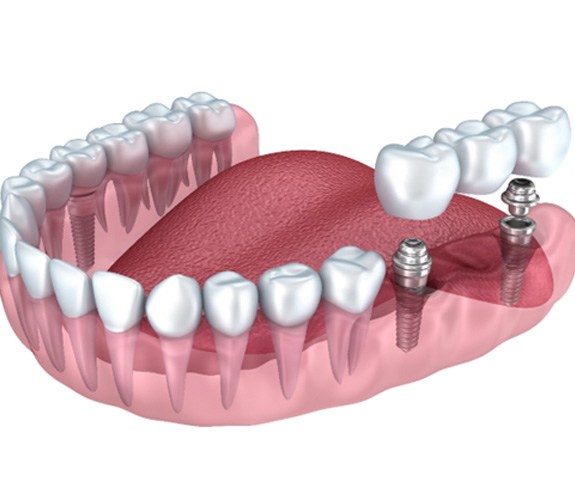
Dental Implants – Channahon, IL
Lifelike, Dazzling New Teeth
If you’re not satisfied how bridges or dentures feel and function in your mouth, you can talk to us about getting dental implants as an alternative. During a complimentary consultation, we can check your mouth and decide whether you’re a good candidate for dental implant surgery. If you are, you’ll be able to experience the full benefits of new teeth supported by dental implants in Channahon, IL.
Why Choose Grand Dental - Channahon for Dental Implants?
- An In-House Periodontal Specialist
- Implants Placed and Restored In-House
- Mini Dental Implants are Offered
What is a Dental Implant?
Dental implants are made out of biocompatible material that slowly fuses with the jawbone after being surgically placed in your mouth. A small metal connector piece called an abutment is attached to the implant after the rest of the mouth has healed in order to hold a bridge, crown, or denture in place.
Benefits of Dental Implants

At Grand Dental – Channahon, our team often recommends dental implants for replacement for a variety of reasons. When it comes to prosthetics, no other options can compare to the overwhelming, long-lasting functionality of dental implants. The benefits of dental implants in Channahon cannot be overlooked and merit further consideration. The following are just some of the advantages you can enjoy with this replacement choice.
Day-to-Day Benefits

- Freedom and ability to eat – Slippage is a common problem with dentures, but dental implants are secure because of osseointegration, which provides stability for a stronger bite. As a result, eating and chewing foods of all kinds is possible.
- Improved oral health – While traditional dentures involve relying on additional products, i.e., denture cleanser, to keep your replacement teeth clean, dental implants in Channahon require the same products and care as natural teeth—a toothbrush, non-abrasive toothpaste, and dental floss—to reduce the risk of gum disease.
- Higher quality of life – Denture-wearers frequently complain about the insecurity of their false teeth; however, those with dental implants don’t have this problem. Instead, they have more confidence when speaking, eating, and smiling.
Health Benefits

- Protecting existing tooth structures – When placing a dental bridge, existing tooth enamel must be removed, but our implant dentist in Channahon can put an implant in the appropriate socket, which keeps healthy teeth intact.
- More jawbone stimulation – After tooth loss, the jawbone deteriorates over time; however, dental implants continue to stimulate the bone when you chew or bite down, leading to better oral health in the long run.
- Teeth remain in place – When one or more gaps are not replaced, the remaining natural teeth can shift out of alignment. Dental implants prevent this from happening and ensure that your teeth stay beautifully straight.
Long-Term Benefits

- High success rate of placement– When performed properly, dental implant surgery has a success rate of 95%. Even after 10 years, this rate remains high at 90%, given that a person maintains their smile as instructed.
- Long-lasting dental implants – At most, dentures and dental bridges may last up to 10 years, at which point they need to be replaced. Dental implants can go more than 30 years!
- Lower cost in the long run – At the beginning, dental implants do cost more. However, in 10, 20, or even 30 years, these prosthetics can save you money because they do not require frequent replacement and adjustments like traditional dentures and bridges.
Who Dental Implants Can Help

We offer complimentary implant consultations for anyone who might need to replace their teeth in the near future. Ideal implant candidates have good oral hygiene habits, do not have oral health issues or problems with their immune system, and have enough jawbone density to support the implants. If there are any problems, we can address them before starting the process.
Who is a Good Candidate for Dental Implants?

Nearly any healthy adult can receive dental implants; however, a scheduled consultation with a member of our Grand Dental – Channahon team is required. During this visit, a patient will undergo a complete oral examination as well as have digital images taken of their mouth. One of our dentists will be checking:
- Overall Health: The individual must be healthy enough to undergo a minor surgical procedure when it’s time to place the dental implants.
- Oral Health: Common dental issues such as gum disease and tooth decay can cause dental implants to fail, so these problems must be addressed before moving forward with permanent tooth replacement.
- Jawbone Density: As the foundation of a person’s new smile, the jawbone must be dense enough to support a person’s custom restoration. If it is not, bone grafting will be required.
If a patient is found to have any kind of dental problem or lacks necessary jawbone density, it doesn’t mean that dental implants are out of the question. Instead, it simply requires the individual to undergo additional treatment before permanent prosthetics can be put in place. These details will be discussed during the consultation, and procedures will be scheduled accordingly if further care is required.
Missing One Tooth

To replace one tooth, we can take a dental implant, surgically place it in the gap, and then attach a beautiful dental crown. This produces a stronger, more durable solution than a fixed dental bridge, especially since it does not require altering healthy abutment teeth, which can sometimes lead to sensitivity and weakening over time.
Missing Multiple Teeth

Using a pair of implants to support a dental bridge lets us replace many teeth at once without having to make any alterations to the enamel you still have. The missing teeth must be consecutive along the upper or lower arch, but the implants can rebuild a person’s smile so that it remains in place longer. We can replace multiple missing teeth with an implant bridge or partial implant denture.
Missing All Teeth/Implant Dentures

It takes around four to eight dental implants to secure a full denture in place so that it doesn’t slip. Since the jawbone is preserved, implant dentures typically don’t lose their fit like traditional dentures. What an individual can expect with a permanent set of teeth is a stronger bite force and a more realistic and natural-looking appearance.
The 4-Step Dental Implant Process

Traditional dentures and dental bridges do not require the same multi-step process that dental implants do. Spanning several months, the time required to place these prosthetics as well as allow for thorough healing and restoration delivery might seem long and arduous; however, once patients witness their results, they are pleased with the time and effort. At Grand Dental – Channahon, our team is pleased to provide the entire dental implant treatment in-house so that individuals can remain in a comfortable atmosphere with familiar faces. With our own periodontist on staff, patients can prepare for a comprehensive and more convenient approach. Keep reading to learn how dental implants work.
Initial Dental Implant Consultation

Our team at Grand Dental – Channahon will meet with the patient to review their oral health and medical history. This will determine if they are eligible to move forward with dental implants. If certain issues are discovered, such as gum disease or tooth decay, we will recommend additional procedures, like gum disease treatment or tooth extraction. This will ensure the mouth is healthier once dental implants are put in place. We’ll also review the jawbone to ensure it is dense enough to support the implant posts. If not, a bone grafting procedure will be required.
Dental Implant Surgery

Our in-house periodontist is pleased to perform the dental implant placement procedure in-house. This eliminates the need for a referral to an outside specialist. On the day of the surgery, the patient will receive local anesthesia to numb the areas of the mouth undergoing treatment. A small incision will be made in the gums to expose the underlying bone. After making a few openings in the jawbone, each implant post will be put into place and positioned properly. Once complete, the gum tissue will be closed, and protective healing caps will be placed over the posts.
Dental Implant Osseointegration/Abutment

While it is true that dental implants have a higher upfront cost than other tooth replacement options (i.e., dental bridges and dentures), their lifespan and permanence make them cost-effective in the long run.
After the surgery is complete, the patient will be sent home to recover. Osseointegration, which is the process of the dental implant posts fusing with the jawbone, must be successful during this time. It can take 4-6 months but once a firm foundation is established, the individual will return to our dental office to have their metal abutments placed on top of the posts. These abutments are small attachments that help to hold the restoration in place once it is secured. It is at this time that we will also capture dental impressions of the patient’s mouth so that the final restoration can be crafted.
Delivery of Dental Implant Restorations

The last phase of dental implant treatment is receiving a custom-made restoration. Because this type of tooth replacement is so versatile, it’s possible for a patient to receive a crown, bridge, or denture. During the consultation, the periodontist will determine which type of restoration is required based on how many teeth the patient is missing. We will ensure that it looks natural and fits comfortably in place once it is attached.
It's at this point that the individual can begin to enjoy their newly rebuilt smile.
Understanding the Cost of Dental Implants

What additional steps are required during the implant process? How many implants are needed? Will you get normal implants or mini-implants? What does the treatment timeline look like? We can answer these questions while forming your treatment plan so that you can start making the necessary financial arrangements as soon as possible. We invite you to spend a few moments reading through the following information. You can call us if you have any questions.
Preliminary Treatments & Dental Implant Surgery

When it comes to the financial components of dental implants, there are two pivotal factors – preliminary care and implant surgery. Your dentist will go over the status of your oral and overall health during a consultation and determine if you need bone grafting, a sinus lift, periodontal therapy, or tooth extraction before moving forward. If so, these will be included as part of your total cost.
Once you’re ready to have your dental implants put into place, our team will complete the process in-house so that you do not need to pay an outside specialist. This makes the payment process easier because it all stays in one place.
The Parts of Your Dental Implant

You may not realize, but your dental implants are made of up different pieces, each with its own price tag. When it comes to breaking down the cost for your titanium or zirconia posts, it might look something like the following:
- The number of dental implant posts needed – Do you need one or six? The more posts you will need, the higher you can expect the price to be.
- The materials used – Zirconia and titanium are the most prominent, so depending on which one your dentist uses, you can expect the corresponding price to be included in your total amount.
- The type of restoration needed – The number of dental implant posts that you need will ultimately determine the kind of restoration you can expect to receive. This will be a dental crown, bridge, or denture.
- The brand – Throughout the country, various manufacturers make dental implants. Our team uses only the best possible materials, which we will discuss with you during your consultation.
How Dental Implants Can Save You Money

While it is true that dental implants have a higher upfront cost than other tooth replacement options (i.e., dental bridges and dentures), their lifespan and permanence make them cost-effective in the long run.
Not only will you avoid the continual cost of denture adhesives to help hold your teeth in place, but you will also avoid frequent readjustments and replacements. Instead of getting a new denture or bridge every 10 years, you can enjoy your smile for 30+ years.
Also, when it comes to dental implants, there are no special products or instruments that you need to use to keep your teeth clean.
Does My Dental Insurance Cover Dental Implants?

You will need to review your dental insurance plan to find out if they offer coverage for dental implants. If you’re unsure where to look or who to call, a member of our Grand Dental – Channahon team can do it for you. Some companies are beginning to discover the necessity of providing some level of coverage, but many are still choosing to view these prosthetics as non-essential. However, even if your actual surgery is not covered, other components might be, including your consultation, custom restoration, and any preliminary procedures you might need.
Making Dental Implants Affordable

To ease the financial burden that can come with dental implants, there are additional payment options available, such as:
- The Grand Advantage Plan allows you to pay a low membership fee for access to an exclusive array of benefits. You also receive a 20% discount on dental services.
- Flexible financing through CareCredit or Alphaeon Credit. This helps to provide a monthly payment plan so that you can avoid high, accumulating interest and instead, avoid surprise fees and pay out your treatment over several months instead of all upfront.
Dental Implant FAQs

The process of getting dental implants can last several months, which is why it is important for patients to feel like they are fully prepared before they commit to the treatment. The following FAQs cover some of the inquiries that our team has heard particularly often from patients who were still trying to decide whether dental implants were right for them. We are always ready to answer any questions you might have about the implant process.
Does Getting Dental Implants Hurt?
Many people find that having dental implants placed is not nearly as uncomfortable as they expected. For one thing, there are not many nerve endings in the jawbone to begin with, and the mouth will be numbed with a local anesthetic beforehand in any case. Furthermore, in many cases patients are sedated before dental implant placement, which further reduces the body’s ability to register pain.
Once surgery is complete and the numbness in the mouth has worn off, most patients experience some level of discomfort for a few days, but they can typically manage it with a prescribed or over the counter pain medication. It is recommended to call the dentist if discomfort worsens instead of improving after two or three days.
Are Dental Implants Safe?
The success rate of dental implants is 95%; as such, the procedure is considered extremely safe. Before an implant dentist starts planning the surgery, they will evaluate the mouth and jawbone for signs of potential complications, such as low bone density and gum disease. Addressing these issues ahead of time can make dental implant surgery safer. An implant dentist also needs to confirm the presence of diabetes, cancer, or other medical conditions that might complicate implant surgery or the healing process so that they can be addressed properly.
What Causes Dental Implants to Fail?
Dental implant failure is very rare; most patients can safely expect their implant posts to last for decades as long as they continue to give them proper care. However, failure is still a possibility, and it generally occurs due to peri-implantitis or failed osseointegration. Peri-implantitis is a type of gum disease that forms around implant posts as a result of poor oral hygiene. Failed osseointegration means that the post does not form a bond with the jawbone, which can happen if there was not enough bone density to begin with. There are other factors for dental implant failure as well, such as teeth grinding and tobacco use.
What is the Right Age for Dental Implants?
Dental implants are not recommended unless the patient’s jaw is fully developed because the post could potentially interfere with bone development. Implants are thus usually not placed in patients younger than 18. Young adults should have their jaws evaluated to make sure that dental implants are a viable option. There is no upper age limit for implant surgery, but older patients are more likely to have health conditions that can interfere with the success of the treatment.
I Need a Checkup & Cleaning I Need a Dentist for My Child I Have a Cavity or Broken Tooth I am Missing One or More Teeth I Am in Pain & Need Help I Want to Enhance My Smile I Want a Straighter Smile I am Concerned About Gum Disease I Have Dental Anxiety I Want to Learn About Sleep Apnea View Our Services